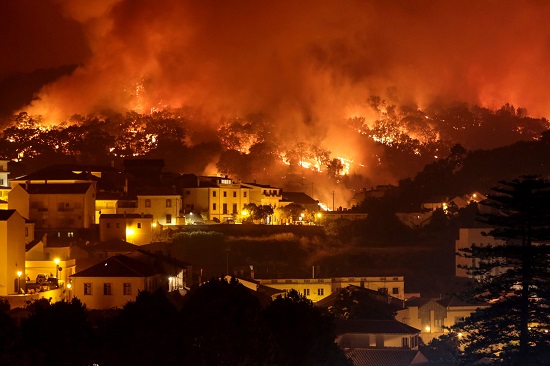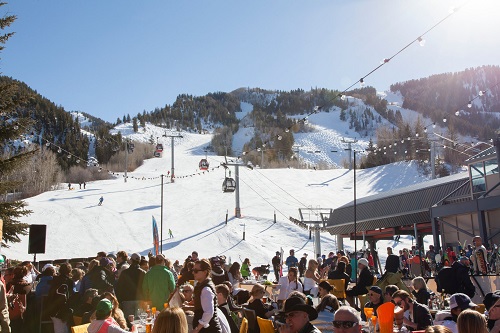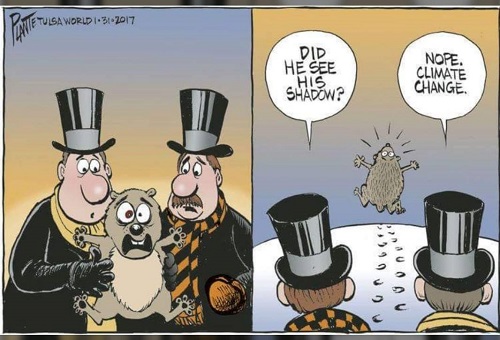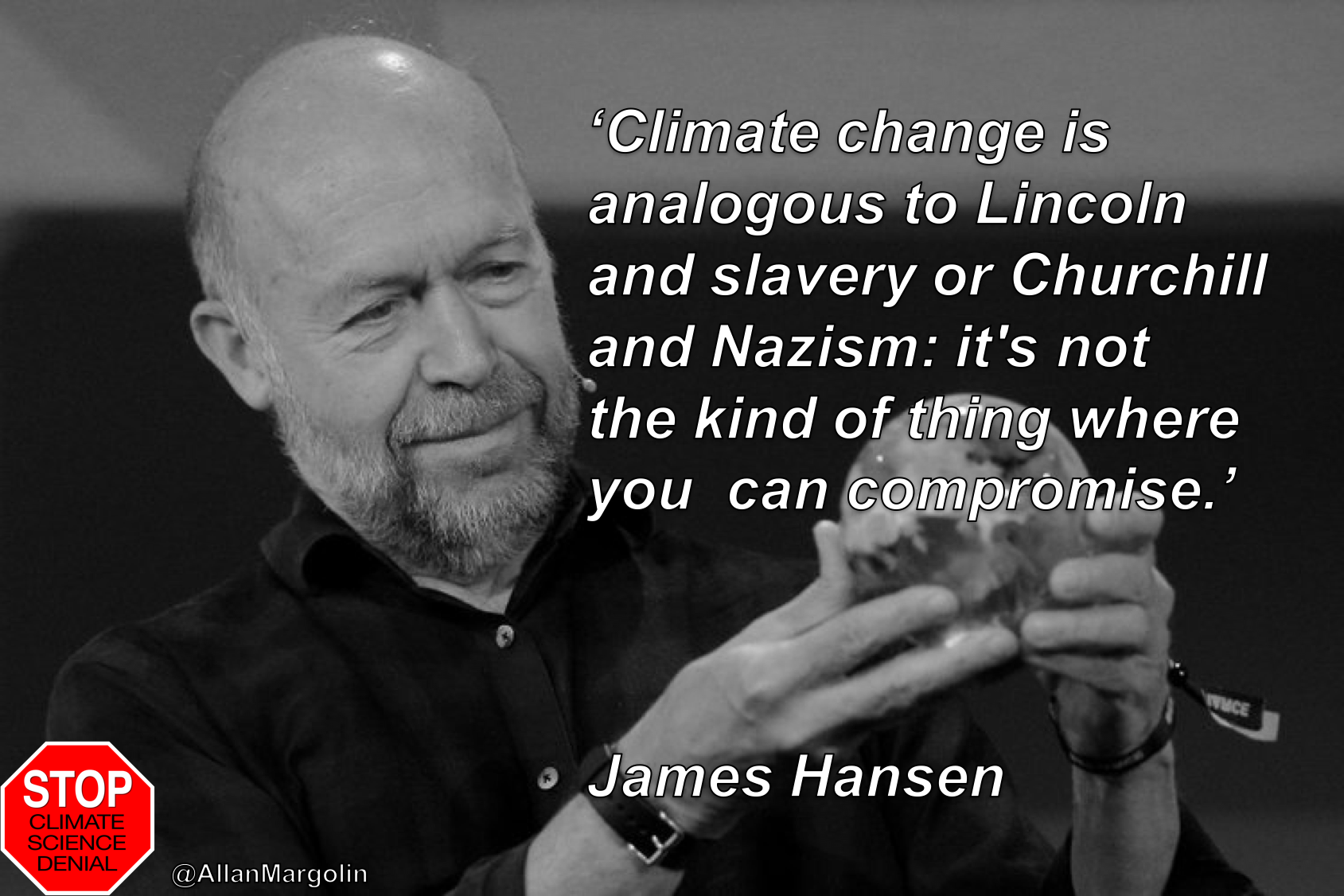2019 SkS Weekly Climate Change & Global Warming Digest #5
Posted on 3 February 2019 by John Hartz
Story of the Week... Editorial of the Week... Toon of the Week... SkS in the News... Video of the Week... Coming Soon on SkS... Poster of the Week... SkS Week in Review...
Story of the Week...
The devastation of human life is in view’: what a burning world tells us about climate change
I was wilfully deluded until I began covering global warming, says David Wallace-Wells. But extreme heat could transform the planet by 2100

A forest fire burns on a hill in Monchique, Portugal, August 2018. Photograph: Filipe Farinha/EPA
I have never been an environmentalist. I don’t even think of myself as a nature person. I’ve lived my whole life in cities, enjoying gadgets built by industrial supply chains I hardly think twice about. I’ve never gone camping, not willingly anyway, and while I always thought it was basically a good idea to keep streams clean and air clear, I also accepted the proposition that there was a trade-off between economic growth and cost to nature – and figured, well, in most cases I’d go for growth. I’m not about to personally slaughter a cow to eat a hamburger, but I’m also not about to go vegan. In these ways – many of them, at least – I am like every other American who has spent their life fatally complacent, and wilfully deluded, about climate change, which is not just the biggest threat human life on the planet has ever faced, but a threat of an entirely different category and scale. That is, the scale of human life itself.
‘The devastation of human life is in view’: what a burning world tells us about climate change, Edited extract from "The Uninhabitable Earth: A Story Of The Future" by David Wallace-Wells, Environment, Guardian, Feb 2, 2019
Editorial of the Week...
Why Can’t Rich People Save Winter?
Ski season is shrinking. Yet the people who love the sport aren’t doing enough to stop climate change.

Outside the Little Nell hotel at the foot of Aspen Mountain in 2015. Photo Credit: Morgan Rachel Levy for The New York Times
From the snow-dusted ridgelines of the Catskills to the rugged summits of the Rocky Mountains, Sierra Nevada and Cascades, winter is slowly disappearing. And snow is receding with it.
We know humans are altering the climate. Temperatures in south-central Colorado have risen two degrees Fahrenheit on average since 1988. In California’s Lake Tahoe region, home to more than a dozen ski areas, warmer temperatures since 1970 have pushed the snow line uphill 1,200 to 1,500 feet. Winter season lengths are projected to decline at ski areas across the United States, in some locations by more than 50 percent by 2050 and by 80 percent by 2090 if greenhouse gas emissions continue at their current rate, according to a 2017 study. Only about half of the 103 ski resorts in the Northeast will be able to maintain an economically viable ski season by midcentury, another study found in 2012.
In Europe, the cradle of ski culture, the problem is even worse. Half the glacial ice in the Alps has already melted; a study published two years ago in The Cryosphere, a journal of the European Geosciences Union,predicted 70 percent less snow in the mountains by the end of the century, threatening a $30 billion ski industry driven by more than 60 million tourists a year.
Why Can’t Rich People Save Winter?, Opinion by Porter Fox, Sunday Review, New York Times, Feb 2,
Toon of the Week...

SkS in the News...
In his article, AP FACT CHECK: Global warming hasn’t gone away despite cold, Seth Borenstein wrote:
Trump is cherry picking cold weather to ignore the larger picture of a warming planet, said John Cook, a professor of climate change communications at George Mason University.
“This myth is like arguing that nighttime proves the sun doesn’t exist,” Cook said.
Video of the Week
Americans’ Concern About Climate Change Surging to Record Levels
Dr. John Kotcher of George Mason University discusses a new poll about climate change and says improvements in media coverage have helped spur the public’s concern about the issue
Americans’ Concern About Climate Change Surging to Record Levels, The Real News Network, Jan 30, 2019
Coming Soon on SkS...
- EVs: Crucial to Reducing CO2 Emissions (Riduna)
- Ocean heat content record (Dana)
- Global coal use may have peaked in 2014, says latest IEA World Energy Outlook (Simon Evans)
- Analysis: The climate papers most featured in the media in 2018 (Robert McSweeney)
- New research this week (Ari)
- 2019 SkS Weekly Climate Change & Global Warming News Roundup #6 (John Hartz)
- 2019 SkS Weekly Climate Change & Global Warming Digest #6 (John Hartz)
Poster of the Week...

SkS Week in Review...
- 2019 SkS Weekly Climate Change & Global Warming News Roundup #5 by John Hartz
- New research, January 21-27, 2019 by Ari Jokimäki
- A Green New Deal must not sabotage climate goals by Dana Nuccitelli (Bulletin of the Atomic Scientists)
- SkS Analogy 18 - Cliff jumping and temperature changes by Evan & jg
- The Methane 'Time Bomb': How big a concern? by greenman3610 (Yale Climate Communications)
- 2019 SkS Weekly Climate Change & Global Warming Digest #4 by John Hartz































 Arguments
Arguments






























The article paints a grim picture of the future if we do nothing, and I find it compelling and reasonably stated. Others have suggested Wells is scaremongering too much, and this could cause people to be overwhelmed and mentally switch off. I did a google search on the effectiveness of using fear to motivate people to change behaviour.
This meta study looked at impacts of using fear based health campaigns and found they do have some modest effect on changing behaviour, provided the fear component is balanced with good efficacy. In other words it has to be based on good evidence, so perhaps articles like Wells are valuable provided the science is right, and not exaggerated, and probabilities are discussed openly. A couple of his claims have been criticised by no less than M Mann. Other scientists have supported Wells and stated the criticisms are quibbles.
This is another interesting excerpt from Wells article:
"But no matter how well-informed you are, you are surely not alarmed enough. Over the past decades, our culture has gone apocalyptic with zombie movies and Mad Max dystopias, perhaps the collective result of displaced climate anxiety, and yet when it comes to contemplating real-world warming dangers, we suffer from an incredible failure of imagination. The reasons for that are many: the timid language of scientific probabilities, which the climatologist James Hansen once called “scientific reticence” in a paper chastising scientists for editing their own observations so conscientiously that they failed to communicate how dire the threat really was; the fact that the country is dominated by a group of technocrats who believe any problem can be solved and an opposing culture that doesn’t even see warming as a problem worth addressing; the way that climate denialism has made scientists even more cautious in offering speculative warnings; the simple speed of change and, also, its slowness, such that we are only seeing effects now of warming from decades past; our uncertainty about uncertainty, which the climate writer Naomi Oreskes in particular has suggested stops us from preparing as though anything worse than a median outcome were even possible; the way we assume climate change will hit hardest elsewhere, not everywhere;..."
Source of copy and paste quote: The Uninhabitable Earth
Famine, economic collapse, a sun that cooks us: What climate change could wreak — sooner than you think. By David Wallace-Wells
Re, "Why Cant' rich people save winter".
Actually, in Australia they have been doing just that for many years now. The largest ski resorts are all very reliant on snow making facilities, which makes the sport significantly more expensive than it was to begin with. Some people claim that it's actually a poor man's sport now, because that's how avid ski buffs end up after a 2 week holiday. Back in the 90's our CSIRO predicted that the resorts would be unviable for skiing by now, but with snow-making facilities the season length has only shrunk by about 10%, and peak season reliability has actually increased a bit.
Re the ski resorts, etc: To cool a city or ski resort and so on one could use wind power to run a heat pump. You can let the cool air out over the ski resort or city and the warm air around the condensation site of the heat pump will rise, taking the heat away from the lower levels. Likewise air conditioners in cities cool the buildings inside and the warm air around the fins rises by convection.
As this is your first post, Skeptical Science respectfully reminds you to please follow our comments policy. Thank You!
I have been a longtime reader but have never posted on this site from my other email registration. John Cox has long been a hero of mine for his commitment to spreading and defending the science of climatology.